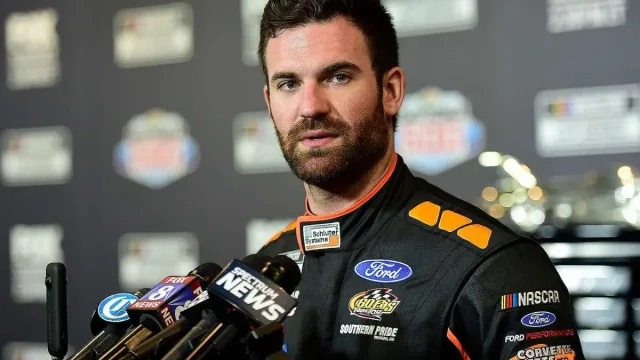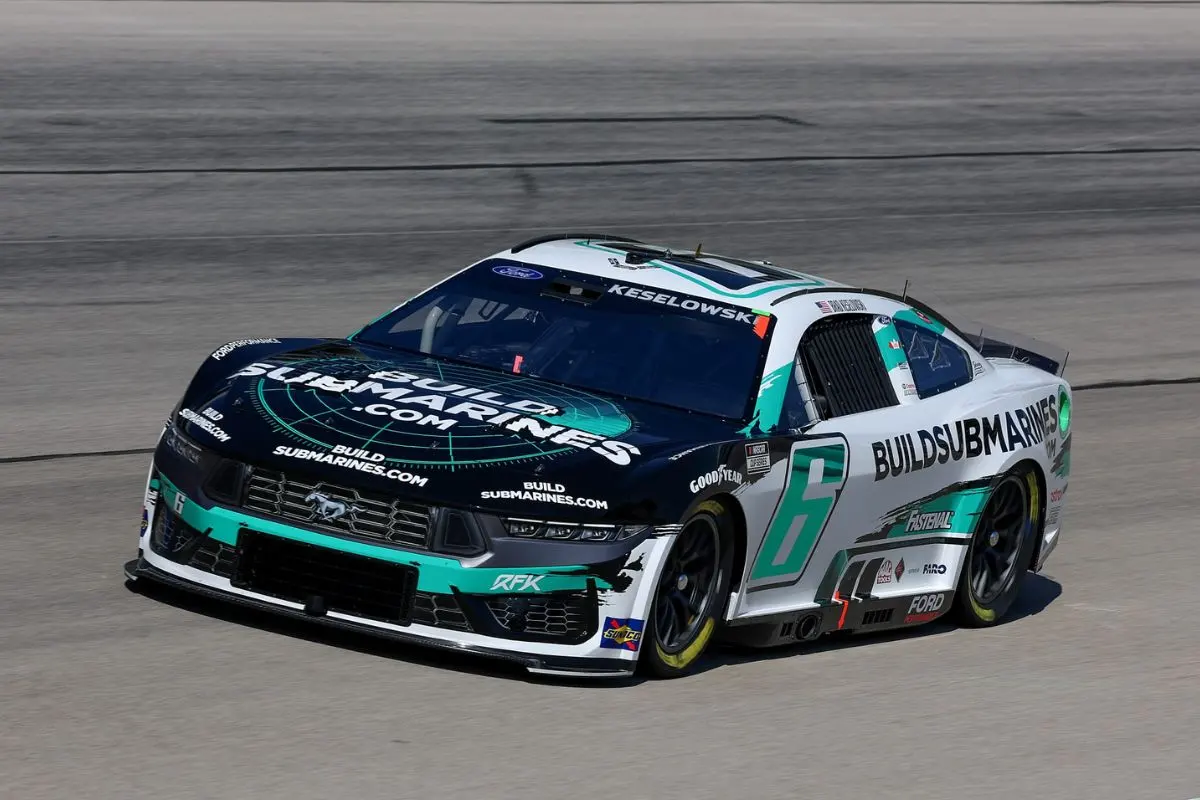Corey LaJoie Falls Victim to RWR’s Cutthroat Move: Corey LaJoie’s exit from RWR highlights a notable trend in motorsport, where profitability increasingly trumps driver loyalty. RWR’s tactical pivot prioritizes financial sustainability through charter leasing and partnerships, particularly with Ford. This shift demonstrates the team’s need for reduced operational costs and improved brand visibility. For Corey LaJoie, this departure marks a challenging turn in his NASCAR career as financial factors overshadow his performance potential.
Key Highlights
- Corey LaJoie’s exit from RWR highlights a shift from driver loyalty to a focus on financial sustainability and business objectives.
- RWR’s decision is driven by revenue generation through charter leasing and reduction of operational costs.
- LaJoie’s performance struggles during the 2024 season diminished his appeal amid RWR’s evolving business model.
- The team’s strategic partnerships emphasize profitability over driver cultivation, impacting LaJoie’s future prospects.
- RFK Racing’s expansion strategy contrasts RWR’s approach, prioritizing growth and sponsorship synergy in NASCAR.
The Departure of Corey LaJoie from RWR
The departure of Corey LaJoie from Rick Ware Racing (RWR) signifies a pivotal moment that encapsulates the complexities of modern motorsport management. This unexpected exit not only raises eyebrows regarding LaJoie’s performance during a challenging 2024 season but also invites scrutiny into the evolving tactical landscape of RWR.
Traditionally, driver loyalty has been a cornerstone of team dynamics; however, LaJoie’s departure suggests a potential paradigm shift prioritizing broader business objectives.
As RWR navigates a landscape filled with competitive challenges and shifting market dynamics, the timing of LaJoie’s exit becomes particularly significant. Recent developments within the organization hint at a recalibrated focus on financial sustainability and tactical partnerships, possibly at the expense of long-standing driver relationships.
This trend highlights a growing awareness among teams that success on the track must be harmonized with financial viability and long-term vision.
In this context, LaJoie’s departure could signal a decisive break from previous operational philosophies that favored loyalty over tactical alignment. The implications are profound; as RWR seeks to redefine its competitive edge, the emphasis may shift towards securing deals that promise greater returns rather than maintaining a stable driver lineup.
Financial Factors Behind RWR’s Decision
RWR’s tactical financial decisions reflect a calculated shift in priorities as they adapt to the evolving landscape of motorsport. The recent leasing of their charter to RFK Racing is a calculated action designed to optimize revenue while minimizing operational costs. By not fielding a car themselves, RWR can still benefit from the charter agreement revenue, ensuring a steady cash flow without the financial burden associated with maintaining multiple full-time entries.
This decision also aligns RWR with Ford’s planned direction, as they remain one of the manufacturer’s experimental teams. Ford’s focus on higher-tier teams that promise better results may lead to increased support for RFK Racing, making RWR’s partnership beneficial in the long run.
Corey LaJoie’s Uncertain Future
Steering through an uncertain future, Corey LaJoie finds himself at a crossroads in his NASCAR career. The recent decision by RWR to prioritize financial stability over driver loyalty has left LaJoie’s prospects hanging in the balance. Despite his vocal ambition and potential, the reality is clear: his tenure with RWR may be coming to an end, as the team recalibrates its focus away from performance-driven driver contracts.
LaJoie’s position is precarious, compounded by the team’s shift towards securing lucrative charter deals rather than cultivating talent that can consistently compete at the highest levels. His inability to break into the top ranks of the Cup Series has not only hindered his performance but also diminished his appeal in a business model that increasingly values profitability over loyalty.
This tactical pivot by RWR suggests that the organization is willing to sacrifice promising drivers like LaJoie for the sake of financial viability. As he investigates options both on and off the track, LaJoie faces an uphill battle in maintaining his presence in NASCAR.
The market for drivers is competitive, and while optimism is crucial, it must be tempered with the understanding that teams are often driven by bottom-line considerations. His future hinges on finding a team willing to invest in his capabilities, despite the financial implications tied to performance metrics.
RFK Racing Expands with Ryan Preece
In a notable move for the 2025 season, RFK Racing will expand its operations to include three full-time cars, with Ryan Preece stepping in as the driver for the newly numbered No. 60 car, backed by Kroger as the primary sponsor. This tactical decision not only emphasizes RFK Racing’s commitment to growth within the highly competitive NASCAR landscape but also signals a notable shift for Preece, who is commencing his sixth full-time Cup Series season.
Preece’s arrival at RFK Racing comes at a crucial moment, as he takes over a charter that once belonged to Corey LaJoie, underlining the shifting dynamics within the sport. RFK’s expansion represents a calculated approach to improve their competitive edge, leveraging Preece’s experience and skill set to strengthen their on-track performance.
The inclusion of Kroger as a primary sponsor further solidifies this initiative, as RFK Racing secures a major partner that has been involved in NASCAR since 2010, enriching their brand presence across all three drivers: Preece, Chris Buescher, and team co-owner Brad Keselowski.
This expansion is indicative of a broader strategy focused on profitability and marketability, as RFK Racing aims to capitalize on the synergy between its drivers and sponsors. By fostering a robust team environment, RFK Racing not only improves its operational capacity but also aligns itself tactically for future successes in the competitive domain of NASCAR, making this an exciting development for both the team and its fan base.
Kroger’s Role in RFK’s Future
As RFK Racing initiates its ambitious expansion plan, Kroger’s involvement stands out as an essential factor in shaping the team’s future. The tactical partnership between RFK Racing and Kroger is expected to deliver notable advantages, particularly as RFK introduces Ryan Preece into the lineup with the newly acquired No. 60 entry. This collaboration aligns with RFK’s broader vision to improve competitiveness in the NASCAR Cup Series, especially with Preece’s grassroots racing experience.
The integration of Kroger as a primary sponsor provides RFK with invaluable resources and marketing synergies, reinforcing their brand presence within motorsports. As they prepare for the 2025 season, the expectation is that this partnership will not only attract new fans but also deepen engagement with existing ones.
This calculated move signifies RFK’s commitment to not just survive but thrive in a highly competitive environment. With Kroger’s support propelling them forward, RFK Racing is poised to make a notable impact in the upcoming season, potentially reshaping the dynamics of the NASCAR landscape.
News in Brief: Corey LaJoie Falls Victim to RWR’s Cutthroat Move
The decision by RWR to part ways with Corey LaJoie highlights a broader trend within the racing industry, where financial considerations increasingly take precedence over loyalty to drivers. This shift may reflect the evolving priorities of team management, emphasizing profitability in a competitive landscape. As RFK Racing expands with Ryan Preece and aligns with corporate partners like Kroger, the implications for driver stability and team dynamics warrant close attention, signaling a potential transformation in the values driving team decisions.
ALSO READ: Corey LaJoie’s NASCAR Career Crumbles as Carson Hocevar Outshines Him in Every Way



